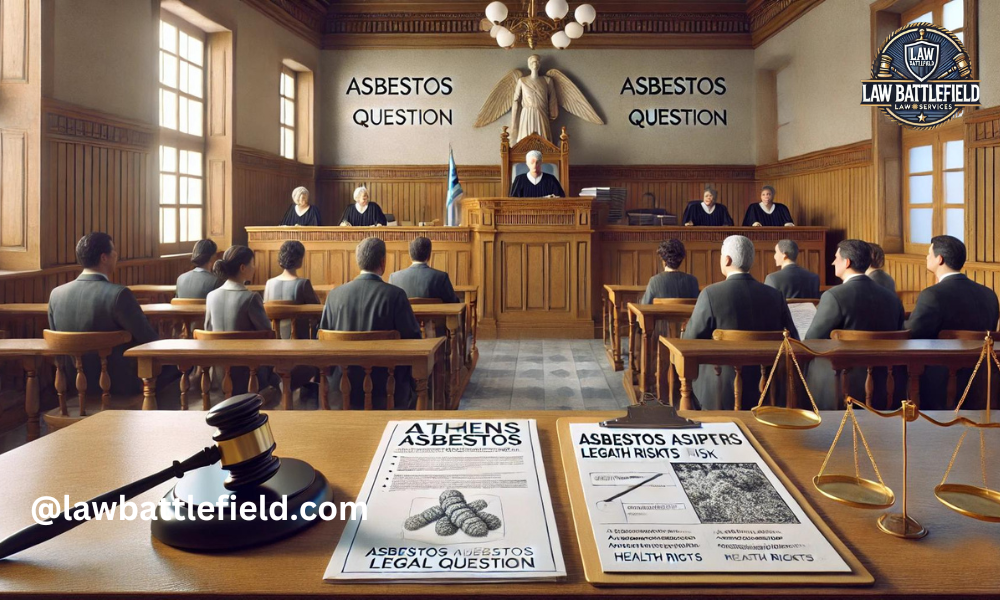Introduction To Asbestos And Its Legal Implications In Athens
Asbestos is a naturally occurring mineral that was once widely used in many industries. It was valued for its durability, heat resistance, and insulating properties, which made it useful in construction materials like insulation, roofing, and flooring. However, over time, it was discovered that asbestos exposure is extremely harmful to human health.
When asbestos-containing materials are disturbed, tiny fibers are released into the air. If inhaled or swallowed, these fibers can cause serious health issues. The most common diseases linked to asbestos exposure are mesothelioma, lung cancer, and asbestosis. Mesothelioma is an aggressive cancer that affects the lining of the lungs and abdomen, while asbestosis is a chronic lung disease that causes scarring in the lungs. These conditions often take years or even decades to develop after exposure, making them difficult to diagnose early.
In Athens, asbestos is still a concern due to the number of older buildings and industrial sites that were built before the material was banned. Many homes, schools, offices, and factories constructed before the ban still contain asbestos. Renovation or demolition work in these buildings can lead to the release of asbestos fibers, putting residents and workers at risk.
As a result, asbestos has become not only a health concern but also a legal issue in Athens. Property owners, contractors, and employers are required to follow strict guidelines to prevent asbestos exposure and ensure safety. Failing to comply with these laws can lead to legal action, especially if someone suffers health problems due to exposure. This situation has led to many legal questions about asbestos in Athens, particularly regarding who is responsible for asbestos management, how to prevent exposure, and what legal rights individuals have if they are affected.
Common Sources Of Asbestos Exposure In Athens
Asbestos exposure is a major concern in Athens, particularly in older buildings and industrial settings. Many structures built before the ban on asbestos still contain materials like insulation, ceiling tiles, and roofing that are laced with asbestos fibers. These materials remain in many homes, schools, offices, and factories across the city.
Asbestos In Older Buildings And Homes
Many buildings in Athens constructed before the 1980s were made with asbestos-containing materials. These materials, used for insulation and fireproofing, can still be found in the walls, ceilings, and floors of older homes and buildings. When these materials are disturbed, such as during home repairs or renovations, asbestos fibers can be released into the air, creating a significant health risk for anyone nearby.
Even if the asbestos remains undisturbed, aging buildings are at risk of wear and tear, which can also lead to the accidental release of asbestos fibers. This is why many old structures in Athens still pose a threat today.
Risk Factors During Renovations And Demolitions
One of the most common ways people in Athens are exposed to asbestos is during renovation or demolition projects. These activities disturb the asbestos-containing materials, which are then released into the air. Workers, residents, and even passersby can breathe in these fibers, which can later cause serious health issues.
Due to the dangers, Greek law requires that any renovation or demolition involving asbestos must be conducted by certified professionals who follow strict safety guidelines. However, not all property owners or contractors adhere to these regulations, putting people at unnecessary risk.
Occupations At Higher Risk
Certain occupations in Athens face a higher risk of asbestos exposure. Workers in construction, shipyards, and factories are particularly vulnerable. In these industries, asbestos was commonly used for its heat-resistant properties, especially in industrial insulation and machinery. Many workers come into contact with asbestos during repairs, installations, or clean-up tasks, often without proper protection.
In addition, firefighters, electricians, and maintenance workers are also at risk due to the potential presence of asbestos in older buildings they might enter during emergencies or routine checks. Unfortunately, these workers are often exposed to asbestos unknowingly, and the health effects may only surface years after the exposure.
Health Impact Of Asbestos Exposure
Asbestos exposure can have severe and lasting effects on a person’s health. When asbestos fibers are inhaled or ingested, they can become lodged in the body’s tissues, leading to serious diseases that may not appear until decades later.
Asbestos-Related Diseases
The most common illnesses caused by asbestos exposure include mesothelioma, asbestosis, and lung cancer. Mesothelioma is an aggressive and often fatal cancer that affects the lining of the lungs, abdomen, or heart. It is almost exclusively caused by asbestos exposure. Asbestosis is a chronic lung disease that causes scarring of lung tissue, making it difficult to breathe. Lung cancer is also frequently linked to asbestos, especially in individuals who smoke. These diseases can severely impact quality of life and are often incurable.
Long Latency Period For Illnesses
One of the unique challenges of asbestos-related diseases is their long latency period. This means that symptoms may not appear until 10 to 50 years after the initial exposure. Due to this delay, many people don’t realize they were exposed until much later in life, making early diagnosis and treatment difficult. The long latency period also complicates legal cases, as proving when and where the exposure occurred can be challenging.
Emotional And Financial Burden
The impact of asbestos exposure goes beyond physical health. The emotional toll on individuals and their families can be enormous. Patients diagnosed with asbestos-related diseases often face anxiety, fear, and uncertainty about their prognosis. Families may also experience emotional distress while caring for a sick loved one.
Additionally, the financial burden can be overwhelming. Medical treatments for asbestos-related diseases, such as chemotherapy, surgery, and long-term care, are expensive. Many patients are unable to work, leading to loss of income. The cost of care, coupled with lost wages, places significant strain on families. Legal action may provide compensation, but the process can be lengthy and complex.
Legal Framework Governing Asbestos In Athens
Asbestos-related legal questions in Athens are governed by a combination of national and European Union regulations. These laws are in place to protect individuals from asbestos exposure and to ensure that property owners, employers, and contractors follow strict safety standards.
National And European Union Regulations
In Athens, Law 4014/2011 is a key piece of legislation governing the management of asbestos. This law requires regular inspections of buildings to identify asbestos-containing materials and mandates proper removal and disposal procedures. Greece also follows European Union Directives on asbestos, which outline strict guidelines for asbestos handling to protect public health and the environment.
EU regulations ensure that asbestos is managed safely during renovations, demolitions, and other projects that might disturb asbestos-containing materials. These laws also mandate that only certified professionals handle asbestos removal, minimizing the risk of exposure to workers and the public.
Guidelines For Safe Handling, Removal, And Disposal
Safe handling of asbestos requires proper planning and specialized equipment. Asbestos removal must be carried out by licensed professionals who adhere to strict protocols to prevent the release of asbestos fibers into the air. These protocols include sealing off affected areas, wearing protective gear, and using specialized tools to safely contain and remove asbestos materials. Disposal of asbestos must be done in designated landfills that meet safety standards to ensure that fibers do not contaminate the environment.
Failure to follow these safety measures can result in significant penalties, including fines or legal action, especially if asbestos exposure causes harm to individuals.
Legal Obligations Of Property Owners, Employers, And Contractors
Property owners, employers, and contractors in Athens have legal obligations to prevent asbestos exposure. Property owners are responsible for ensuring that buildings under their management are free from asbestos hazards, especially during renovations or repairs. They are required to conduct asbestos assessments and hire certified professionals for any removal tasks.
Employers, especially in construction and industrial sectors, must provide a safe work environment. This includes conducting asbestos risk assessments, offering protective equipment, and ensuring that any asbestos-containing materials are properly managed. Contractors working on older buildings must follow strict asbestos-handling procedures to ensure the safety of their workers and the public.
Responsibilities Of Property Owners And Employers
Importance Of Asbestos Inspections And Risk Assessments
Property owners and employers in Athens hold critical responsibilities when it comes to managing asbestos. One of the most important obligations is conducting asbestos inspections and regular risk assessments. In buildings or workplaces constructed before the ban on asbestos, inspections are necessary to identify areas that may contain asbestos. Failing to conduct these inspections can put residents, employees, and the public at risk of exposure. Regular risk assessments help monitor the condition of asbestos-containing materials, ensuring they are not deteriorating and releasing harmful fibers into the air.
Proper Asbestos Management, Removal Procedures, And Employee Training
Once asbestos is identified, it must be managed correctly. This includes creating asbestos management plans that outline how the material will be handled and removed. Licensed professionals must carry out the removal under strict regulations to ensure the safety of everyone involved. Proper removal procedures include sealing off the affected area, using protective equipment, and ensuring the safe disposal of asbestos materials at designated sites.
Employers are also responsible for employee training on asbestos risks. Workers, especially in high-risk jobs like construction and maintenance, must be informed about the dangers of asbestos and taught how to handle materials safely. Providing protective gear and ensuring that workers follow proper safety protocols are key aspects of these responsibilities.
Legal Consequences Of Non-Compliance With Asbestos Regulations
Non-compliance with asbestos regulations can lead to serious legal consequences. Property owners and employers who fail to manage asbestos properly can face fines, lawsuits, and potential criminal charges if their negligence leads to asbestos exposure. Legal action may be taken by individuals who develop health problems from exposure, resulting in financial liability for medical expenses, lost wages, and pain and suffering. Additionally, government authorities may impose penalties for failing to adhere to regulations regarding inspections, removal, or employee safety protocols.
Legal Rights Of Individuals Affected By Asbestos
Right To Compensation For Health Damages Due To Asbestos Exposure
Individuals who have been exposed to asbestos in Athens have the legal right to seek compensation for the health damages they suffer as a result. This includes those who develop asbestos-related diseases like mesothelioma, lung cancer, or asbestosis. Victims can seek financial compensation to cover medical treatments, ongoing care, and other related expenses. Compensation also often covers the emotional toll and diminished quality of life caused by these severe illnesses.
Filing Lawsuits Against Negligent Parties
To claim compensation, individuals affected by asbestos exposure can file lawsuits against negligent parties. These may include property owners who failed to properly manage asbestos in their buildings, employers who neglected to protect their workers, or manufacturers of asbestos-containing products. In such lawsuits, victims must prove that their illness was directly caused by asbestos exposure due to the negligence of the responsible parties. The legal process often involves gathering medical records, work history, and expert testimony to support the claim.
Types Of Compensation Available
Victims of asbestos exposure can seek several types of compensation, including:
- Medical expenses: This covers the cost of treatments, surgeries, medications, and any ongoing care related to asbestos-related illnesses.
- Lost wages: Individuals who are unable to work due to their illness may claim compensation for lost income, including future earnings.
- Pain and suffering: Compensation can also be awarded for the physical pain, emotional distress, and diminished quality of life caused by asbestos-related diseases.
In some cases, punitive damages may also be awarded if the court finds that the responsible parties acted with gross negligence or intentional misconduct.
Key Legal Considerations And Strategies For Asbestos Claims
When pursuing an asbestos-related claim in Athens, it’s crucial to understand the key legal factors that can impact the success of your case.
Importance Of Documentation
Documentation is the backbone of any successful asbestos claim. To strengthen your case, it’s important to collect:
- Medical records that link your illness to asbestos exposure. This includes diagnoses of diseases like mesothelioma, lung cancer, or asbestosis, as well as detailed information on treatment plans and prognosis.
- Asbestos inspections from your workplace or home that demonstrate the presence of asbestos and indicate when and how you were exposed. These inspections are crucial for proving the negligence of property owners, employers, or manufacturers.
- Legal consultations early in the process are essential. Consulting with an attorney who specializes in asbestos litigation helps you understand your rights, gather the necessary evidence, and navigate the complex legal landscape. This consultation should include reviewing past exposures and any known asbestos management failures at your workplace or residence.
Working With Legal Professionals To Navigate Complex Asbestos Litigation
Asbestos litigation is notoriously complex. It’s important to work with experienced legal professionals who specialize in asbestos cases. These attorneys understand the intricacies of asbestos law, including national and European Union regulations, and can build a strong case by connecting exposure to your illness. They can also help identify all liable parties, which may include former employers, property owners, or product manufacturers.
Potential Challenges And Strategies For Pursuing Compensation Successfully
One of the biggest challenges in asbestos litigation is proving that asbestos exposure caused the illness, particularly when the disease has a long latency period. To overcome this, strategies include:
- Expert testimony: Lawyers often use medical and occupational experts to explain how asbestos exposure leads to diseases like mesothelioma. These experts can testify about how and when exposure likely occurred.
- Statute of limitations: In Greece, like in many countries, there is a legal time limit within which you must file your claim. It is important to act quickly once diagnosed to ensure your claim is filed within the allowable time.
- Multiple defendants: In some cases, more than one party may be liable for the exposure, such as manufacturers of asbestos-containing products or multiple employers. Identifying all responsible parties increases the likelihood of receiving compensation.
High-Profile Asbestos Cases In Athens
Athens has seen several high-profile asbestos cases, particularly involving military personnel and industrial workers who were exposed to asbestos in the line of duty.
Examples Of Successful Asbestos-Related Lawsuits In Athens
One notable case involved a retired officer of the Hellenic Navy, who was awarded compensation after developing mesothelioma due to asbestos exposure during his service on military ships. The Athens Administrative First Instance Court ruled that the Greek Ministry of Defense was liable for failing to protect its personnel from asbestos exposure onboard its ships. The court awarded significant damages for the officer’s moral suffering and medical expenses.
In another case, a Greek merchant marine electrician was exposed to asbestos while working aboard ships, resulting in pleural mesothelioma years after his last voyage. He successfully sued more than 25 parties, including shipowners and manufacturers of asbestos-containing equipment, in a U.S. court. The lawsuit ended in a settlement, providing substantial compensation for his medical bills and loss of earnings.
Compensation For Mesothelioma Victims
These cases highlight the types of compensation available for victims of asbestos exposure. In most successful lawsuits, compensation covers:
- Medical expenses, including surgeries, treatments, and medications.
- Lost wages and future earnings if the illness prevents the individual from working.
- Pain and suffering compensation for the physical and emotional toll of the disease.
- In some cases, additional punitive damages may be awarded if the responsible party’s actions were particularly negligent or reckless.
These cases demonstrate how asbestos victims in Athens can successfully pursue legal action to hold negligent parties accountable and receive compensation to cover the heavy financial and emotional burdens caused by asbestos-related illnesses.
The Future Of Asbestos Management In Athens
Ongoing Efforts And The 2035 European Directive For Complete Asbestos Removal
The future of asbestos management in Athens is shaped by the 2035 European Directive, which mandates the complete removal of asbestos from all public and private buildings across the EU by this year. This directive has set the stage for ambitious asbestos abatement efforts, requiring ongoing removal projects in schools, government buildings, and other public spaces that may still contain asbestos. While significant progress has been made in identifying and managing asbestos in older structures, this goal is challenging due to the widespread presence of asbestos in both residential and industrial buildings.
Challenges In Removing Asbestos From Public And Private Buildings
The task of removing asbestos poses significant challenges in Athens. Many public and private buildings are old, and the economic crisis delayed asbestos removal efforts, making it harder to meet the 2035 target. The cost of asbestos removal is also high, often discouraging private property owners from initiating the process. Additionally, the process of removing asbestos safely is complicated and requires certified professionals, further adding to the cost and logistical difficulties.
Another challenge is ensuring that asbestos removal is done without endangering workers or the public. Improper handling during renovations or demolitions can release harmful fibers, leading to health risks for anyone in the vicinity.
The Need For Regular Asbestos Inspections And Possible Subsidy Programs
To effectively manage asbestos, regular inspections are essential. Buildings, especially those constructed before the 1980s, should undergo thorough asbestos inspections to identify any materials that may pose a risk. Regular monitoring helps prevent accidental exposure and ensures compliance with the EU’s asbestos regulations.
To support asbestos removal efforts, subsidy programs may be necessary. These programs could provide financial assistance to property owners, especially in the private sector, to help cover the cost of asbestos inspections, management, and removal. Government incentives would encourage more proactive asbestos removal and help achieve the 2035 directive’s goals.
Conclusion
Recap Of The Health Risks And Legal Rights Related To Asbestos
Asbestos exposure poses severe health risks, including the development of mesothelioma, lung cancer, and asbestosis. These diseases often emerge years after exposure, making it essential for individuals to understand the potential dangers associated with asbestos-containing materials. Residents and workers in Athens who have been exposed to asbestos have legal rights, including the right to seek compensation for health damages and medical costs.
Importance Of Compliance With Asbestos Laws For Both Individuals And Businesses
Both individuals and businesses must comply with asbestos laws to avoid legal consequences and protect public health. Property owners, employers, and contractors must ensure that asbestos-containing materials are handled safely and removed by certified professionals. Non-compliance with asbestos regulations can result in heavy fines, lawsuits, and long-term liabilities, especially if exposure leads to health problems.
Final Thoughts On Seeking Legal Advice And Protecting Health From Asbestos Exposure
If you or someone you know has been exposed to asbestos, seeking legal advice is critical. A specialized asbestos attorney can help navigate the legal complexities and guide victims in filing claims for compensation. Early legal action can provide financial relief for medical expenses and loss of income, ensuring that victims and their families receive the support they deserve.
FAQs
What Is Asbestos, And Why Is It Dangerous?
Asbestos is a naturally occurring mineral that was widely used in building materials for its durability and heat resistance. However, when disturbed, it releases microscopic fibers that can be inhaled, leading to serious health issues like mesothelioma, lung cancer, and asbestosis.
How Do I Know If My Home In Athens Contains Asbestos?
Homes built before the 1980s may contain asbestos in insulation, roofing, or flooring. The only way to confirm its presence is through a professional asbestos inspection by a certified expert.
What Should I Do If I Think I’ve Been Exposed To Asbestos?
If you suspect exposure, it’s important to seek medical advice immediately and have a health screening for asbestos-related conditions. Additionally, consult with a lawyer to understand your legal options for compensation.
What Are My Legal Rights If I’m Exposed To Asbestos In Athens?
If you are exposed to asbestos due to negligence, you may have the right to file a lawsuit against responsible parties, including property owners, employers, or manufacturers, to seek compensation for medical bills, lost wages, and pain and suffering.
Are There Any Laws Regulating Asbestos Removal In Athens?
Yes, Greece follows strict national regulations, including Law 4014/2011, and European Union directives that govern the safe handling, removal, and disposal of asbestos to protect public health.
What Is The 2035 European Directive On Asbestos?
The 2035 European Directive mandates the complete removal of asbestos from public and private buildings across the EU, with the aim of eliminating the health risks associated with asbestos exposure by that year.
Can I Remove Asbestos From My Property Myself?
No, asbestos removal must be conducted by licensed professionals who follow strict safety protocols. Attempting to remove asbestos on your own is not only dangerous but also illegal under Greek and EU law.
Was this article helpful? Check out more on Lawbattlefield.com
Understanding The Anderson Asbestos Legal Question: Key Insights For Victims Seeking Compensation





